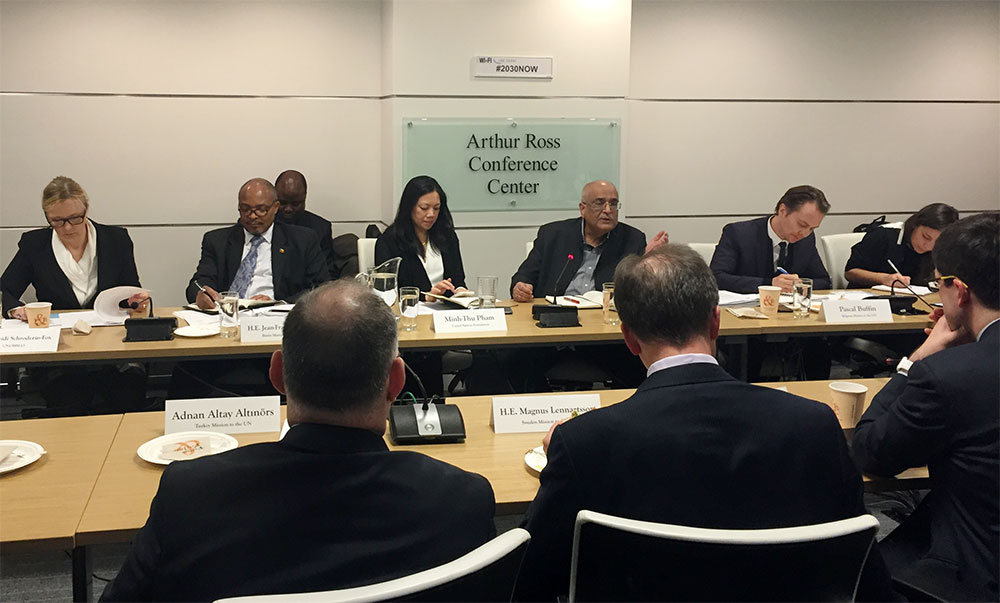
Three sets of factors have constrained the delivery of the special programme for the LDCs. These are, namely, inhospitable global economic environment; inability of international development partners to meet their commitments; and lack of domestic reforms in the least developed countries (LDCs).
These observations came from Dr Debapriya Bhattacharya, the Chair of LDC IV Monitor, who was a featured speaker at the recent roundtable captioned “The Istanbul Programme of Action (IPoA): A discussion on successes, challenges and the midterm review” organised by the United Nations Foundation on 7 April 2016, New York.
Other panel speakers included Ambassador Jean-Francis Zinsou, Permanent Representative of Benin; Mr. Pascal Buffin, Deputy Permanent Representative of Belgium; and H.E. Heidi Schroderus-Fox, Director of the Office of the High Representative for LDCs, LLDCs and SIDS.
The United Nations Foundation hosted this roundtable to provide the member-states with an opportunity to reflect on the draft outcome document that has been co-facilitated by the Ambassadors of Benin and Belgium, and is to be adopted in Antalya, Turkey on 27-29 May 2016. The session also sought to clarify common goals for the Mid-term Review (MTR) of the declaration and special programme for LDCs viz. the Istanbul Programme of Action (IPoA) for the Least Developed Countries for the Decade 2011–2020, adopted at the Fourth United Nations Conference on LDCs in Istanbul (2011).
The roundtable provided a platform for the member states to figure out what they must do in advance of the MTR, to set them up for SDG implementation in LDCs, and to consider the strategic outlook for the remaining five-year period of the IPoA.
The discussion, which was held under the Chatham House Rule, convened diplomats from a range of missions and from the UN system to exchange views.
Key Takeaways from the Roundtable
- LDCs want to become inclusive, prosperous countries that are able to contribute efficiently to global markets, and their internal processes must be taken into account. As a group, LDCs have made great strides, but there is still much more that needs to be done.
- In the past five years, poverty in LDCs has been brought down from 66% to 45%, but overall, the proportion of global poor in LDCs has not significantly improved. LDCs in Africa have seen increases in the populations of poor people, in part because imports have grown faster than exports. Poverty numbers can be attributed to general global economic slow-down, the reduction of financing, as well as malgovernance within countries and its implications.
- The Mid-term Review is taking place at a critical time after four landmark agendas—Sendai, 2030 Agenda, Addis Ababa Action Agenda, and the Paris Climate Agreement—that represent a comprehensive new development charter and provide a structure for future support to LDCs. The Review will be an opportunity to test synergy between the IPOA and these agendas and to capitalize on this moment of unprecedented global consensus that the LDCs must be at the center of development cooperation.
- LDCs nearing graduation from LDC status have seen donors begin to withdraw, which has made national authorities nervous since these countries’ economic situations are typically unable to compensate for the loss of funds. There is a tension between putting aid toward the most vulnerable and continuing to support developing countries after they have graduated from LDC status.
- The financial and migration crises have contributed to constrained budget environments, and levels of ODA to LDCs have decreased as a result. While ODA is not zero-sum, in a constrained environment it can sometimes feel like zero-sum. There are other factors—such as market access, blended finance and even policy decisions—that can help developing countries.
- While the UN Committee for Development Policy is working on a post-graduation strategy that includes incentives for graduating, each country must work out its own graduation strategy. The committee will hold a side-event on this topic in Antalya during the Review and has collaborated with countries recently up for graduation to better understand factors that may make a country delay graduation.
- Linkages between the SDGs and the IPOA are effective political entry points because all countries have a stake in the SDGs. Highlighting interlinkages between challenges can also help develop optimal delivery strategies and improve impact. The theme of “leaving no one behind” can be applied to LDCs to draw attention to the most vulnerable populations.
- A concrete mechanism for resilience building that relates to conflict, climate crises, health crises and financial shocks may be launched during the upcoming review, and the US Millennium Challenge can be a model for performance benchmarks that define what it means to graduate from LDC status.
- The technology bank is a new General Assembly organ and a concrete deliverable of the mid-term review that can help LDCs with their technology needs.


